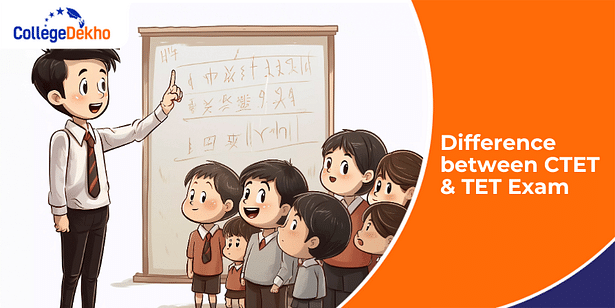The difference between the CTET and TET exams is that the Central Teachers Eligibility Test (CTET) is conducted by the Central Government, whereas the Teachers Eligibility Test (TET) is conducted by the state governments of each respective state.

The
main difference between CTET & TET Exam
is that the CTET is conducted by the Central Government to recruit teachers for primary and elementary education in Kendriya Vidyalayas and other centrally-run schools. Whereas, the Teachers Eligibility Test (TET) is conducted by state governments for similar roles within each state, with appointments based on candidates' test ranks.
TET and CTET are exams for recruiting teachers in government-run schools. The CTET is conducted by the Central Government, while the TET is conducted by state governments. Although both serve the same purpose, they differ in job vacancies, applicable schools, and test applicability. CTET stands for Central Teacher Eligibility Test, and TET stands for Teacher Eligibility Test. Here are the key differences between TET and CTET.
Also Read:
Difference Between TET and CTET
To learn the differences between TET and CTET, let’s individually understand both in detail.
What is CTET?
CTET or Central Teachers Eligibility Test is a test that is conducted by the Central Government for the purpose of recruiting eligible teachers for primary or elementary education in India. The CTET 2024 is set to be held on July 7, 2024 . CTET scores will help candidates land a teacher’s position in one of the Kendriya Vidyalayas or any other Centrally-run Government Schools.
Therefore, if you wish to secure a job in one of the Kendriya Vidyalayas or other Central Government-run schools, then you will be required to appear for the Central Teachers Eligibility Test or CTET. Applicants will be able to find a Central Government-run school situated all across India in all states. However, they will only be able to secure a job position in one of the Centrally-run Government Schools.
What is TET?
TET or Teachers Eligibility Test is a test that is conducted by the state governments of each state. As per the requirements, those who are interested in bagging a teachers position in one of the Government schools will need to appear for the Teachers Eligibility Test. Depending on the rank obtained by the candidate, the vacant positions in the Government schools will be filled.
Since TET is conducted at the state level, candidates will be eligible for teaching posts in government schools of the state they appear the test for. For instance, if you wish to take admission to the government schools in Karnataka, you will be required to appear for Karnataka TET. As per your rank in the Karnataka TET exam, you will be offered the teachers position. With the rank in the state TET score, the candidates will be able to take admission in one of the state government-run schools except for the central government-run schools of the state such as Kendriya Vidyalaya, etc.
Based on the TET and CTET definitions mentioned above, we can conclude the following statements:
CTET will allow candidates to be recruited all over the country, meanwhile, TET examinations are only applicable for the particular state exam you appeared for.
CTET score will allow the candidates to be recruited in central government-run schools such as Kendriya Vidyalaya Navodaya Vidyala, etc. Meanwhile, the TET scores will allow the student to be recruited in one of the state government-run schools situated in a particular state.
Students appearing for CTET can appear in any language they are comfortable with, however, candidates who wish to appear for the TET examination will need to be fluent in the state language, i.e. the Domicile Language, respective to the TET exam they wish to sit in.
These are the major differences between TET and CTET exams in India. The other difference may include the application fee and the application of the Teachers Eligibility Test. Usually, TET application fees and application process will be determined by the state government for that particular year.
Application Fee for TET and CTET
As mentioned above, the application fee that the candidates will have to pay during the application process differs between TET and CTET. All candidates irrespective of the examination they choose will be asked to pay the application fee for TET and CTET. However, since these are government-conducted examinations, the candidates from different reserved categories will be offered relaxation in the payment of the application fee as per the government rules.
As mentioned above, the TET and CTET application fees will be determined by the respective governments, i.e. the Central Government or the State Governments. To apply for the CTET exam, the candidates from the general category will need to take pay an application fee of ₹700 for one paper, while the application fee for both the papers will be ₹1,200. While the candidates from the reserved categories will have to pay the CTET application fee of ₹350 for one paper, for both the papers, the application fee will be ₹600.
The candidates who are aspiring to appear for the TET exam of any particular state will be determined by the state government of each state. Since there is a TET examination for each state, the application fee for each state TET exam will vary from state to state. However, the average TET application fee will range between ₹400 to ₹500 for the General Category, while the application fee for the reserved category candidates may range between ₹200 to ₹300.
If you wish to attempt one of the State Teachers Eligibility Criteria, then here is a list of TET exams in India 2023-24 that are conducted across the country.
Also Read: List of Documents Required to Fill CTET 2024 Application Form
If you are interested in appearing for either TET or CTET in the future, candidates are suggested to visit our page on various state-level TET exams and CTET exams that are conducted twice a year annually. You will be able to understand the eligibility criteria, application process and other important aspects of appearing for a Teachers Eligibility Test in India.
Eligibility Criteria for CTET and TET
Before applying for either of the teacher recruitment examinations, the candidates will need to ensure that they have satisfied the eligibility criteria for CTET and TET. Both examinations require candidates to have a valid degree in education or elementary education field, i.e. B.El.Ed, B.Ed, D.El.Ed.
The eligibility criteria for CTET and TET are the same and all candidates are required to have a degree in education along with other educational qualifications. For example;
Candidates who have completed their class 12 board examination and have a D.El.Ed. degree and have obtained a minimum aggregate score of 50% (45% for reserved category) are eligible for the exam.
Candidates with a graduate degree in any discipline and have completed a 2-year D.El.Ed programme, are eligible for the exam.
Candidates who scored a minimum aggregate score of 50% in their class 12 board exam and completed a four-year B.El.Ed programme.
Candidates who have cleared the class 12 board exam with a minimum aggregate score of 50% and completed a 2-year D.El.Ed programme in Special Education, they are also eligible for the exam.
Candidates who have completed their graduation and obtained a minimum aggregate score of 50% in the qualifying exam as well as have a valid B.Ed degree are also eligible for the exams.
Exam Pattern of TET and CTET
As mentioned above, there are not a lot of differences between the two examinations which is valid for the exam pattern of TET and CTET. The candidates who are preparing for one of the Teachers Eligibility Test and are confused about the exam pattern for either TET or CTET must note that there are no changes between the two exams. The duration of the examination for both TET and CTET is 150 minutes for each paper. In the table below, we have provided the information regarding the CTET exam pattern and TET exam pattern:
CTET and TET Paper 1 Pattern Highlights | CTET and TET Paper 2 Pattern Highlights |
|---|---|
Exam mode: Offline (OMR Sheet based) | Exam mode: Offline (OMR Sheet based) |
Question type: Multiple Choice Questions (MCQs) | Question type: Multiple Choice Questions (MCQs) |
Exam duration: 150 minutes | Exam duration: 150 minutes |
Total marks: 150 | Total marks: 150 |
1 mark for each correct answer | 1 mark for each correct answer |
No negative marking | No negative marking |
CTET and TET syllabus
CTET and TET typically follow the same syllabus. In the table below, we have pointed out the subject-wise contents of the TET and CTET syllabus 2024 along with the marks:
- Subject-wise CTET & TET syllabus for Paper 1
Subjects in CTET and TETs | Topics | Marks |
|---|---|---|
Child Development and Pedagogy | 1. Development of a Primary School Child 2. Concept of Inclusive education and understanding children with special needs 3. Learning and Pedagogy | 15 5 10 |
Language 1 & 2 (30 questions in each) | 1. Language Comprehension 2. Pedagogy of Language Development | 15 15 |
Mathematics | 1. Content (numbers, solving simple equations, algebra, geometry patterns, time, measurement, data handling, solids, data handling, etc.) 2. Pedagogical issues | 15 15 |
Environmental Studies | 1. Content (environment, food, shelter, water, family and friends, etc.) 2. Pedagogical issues | 15 15 |
- Subject-wise CTET & TET Syllabus for Paper 2
Subjects in CTET and TET | Topics | Marks |
|---|---|---|
Child Development and Pedagogy | 1. Development of an Elementary School Child 2. Concept of Inclusive education and understanding children with special needs 3. Learning and Pedagogy | 1x 15=15 1x 5= 5 1x 10= 10 |
Language 1 &2 (each contains 30 questions) | 1. Language Comprehension 2. Pedagogy of Language Development | 1x 15= 15 1x 15= 15 |
Mathematics and Science | 1. Mathematics Number system, Algebra, Geometry, Mensuration, Data Handling Pedagogical issues 2. Pedagogical issues 3. Science Food, Materials, The world of the living, Moving things, people and ideas, How things work, Natural phenomena and resources 4. Pedagogical Issues | 1x 20= 20 1x 10= 10 1x 20= 20 1x 10= 10 |
Social Science | 1. History, Geography, Social and Political Life 2. Pedagogical Issues | 1x 20= 20 1x 10= 1 |
Career Prospects after TET and CTET
The candidates who are planning to take part in either TET or CTET this year or in the future must note that the future prospects through either of the exams remain similar. The positions and the packages that are offered to the candidates who clear CTET and TET are based on the experience and skills that they have gained over the years.
However, the major differences that occur after appearing for the CTET or TET examinations depend on the kind of government schools candidates will be offered positions at. In other words, candidates who have appeared for the CTET examinations will be offered jobs in schools that are run by the Central Government alone, as has been mentioned above. Meanwhile, the candidates who have appeared for one of the State TET exams will be offered jobs, in the specific state government-run schools.
Related Links:
To elaborate on the above-mentioned point, every state will have a few Central Government-run Schools as well as State Government-run schools. Candidates who have appeared for CTET will be able to secure a job in one of the central government-run schools in India only, and not in any other state government-run schools. Candidates who have appeared for one of the State TET exams will only be able to secure a position in one of the state-government schools respective to the State TET that they have appeared for. However, they will not be able to secure a job in one of the Central Government-run schools in that state.
Are you feeling lost and unsure about what career path to take after completing 12th standard?
Say goodbye to confusion and hello to a bright future!

FAQs
There is no restriction on the number of attempts to acquire a TET certificate. The TET exam can be conducted twice a year, annually, or every two to three years, depending on the state.
Yes, the CTET certificate is valid for a lifetime, effective from 2011. This means candidates who passed the exam in 2011 or later have lifetime validity for their certificates.
To be eligible for the CTET exam, a candidate must have a Senior Secondary (or equivalent) degree with at least 50% marks and must have passed or be in the final year of a 2-year Diploma in Elementary Education or a 4-year Bachelor of Elementary Education.
There is no limit to the number of attempts to acquire a CTET certificate. Candidates can retake the exam to improve their scores.
CTET is highly sought after as it is conducted at the central level, allowing candidates to qualify for teaching positions in both state and central government schools.While the TET exams are state-level exams but are considered equally good.
No, TET and CTET are not the same. CTET is conducted by the Central Board of Secondary Education (CBSE) for recruiting teachers in central government schools like Kendriya Vidyalaya and Navodaya Vidyalaya. TET is conducted by state governments for recruiting teachers in state-run government schools.
Was this article helpful?


















Similar Articles
List of Best Books for B.Ed Entrance Exams 2025
Andhra Pradesh B.Ed Admission 2025: Counselling Dates, Process, Fees & Documents
SCERT Odisha B.Ed Admission 2025: Dates, Application Form, Eligibility, Selection Process
Telangana B.Ed Admission 2025: Exam Date, Eligibility, Admit Card, Result
Bihar B.Ed Admission 2025: Exam Dates, Eligibility, Application, Selection Process, Top Colleges
TS EDCET Previous Year Question Papers & Highlights: Download PDF